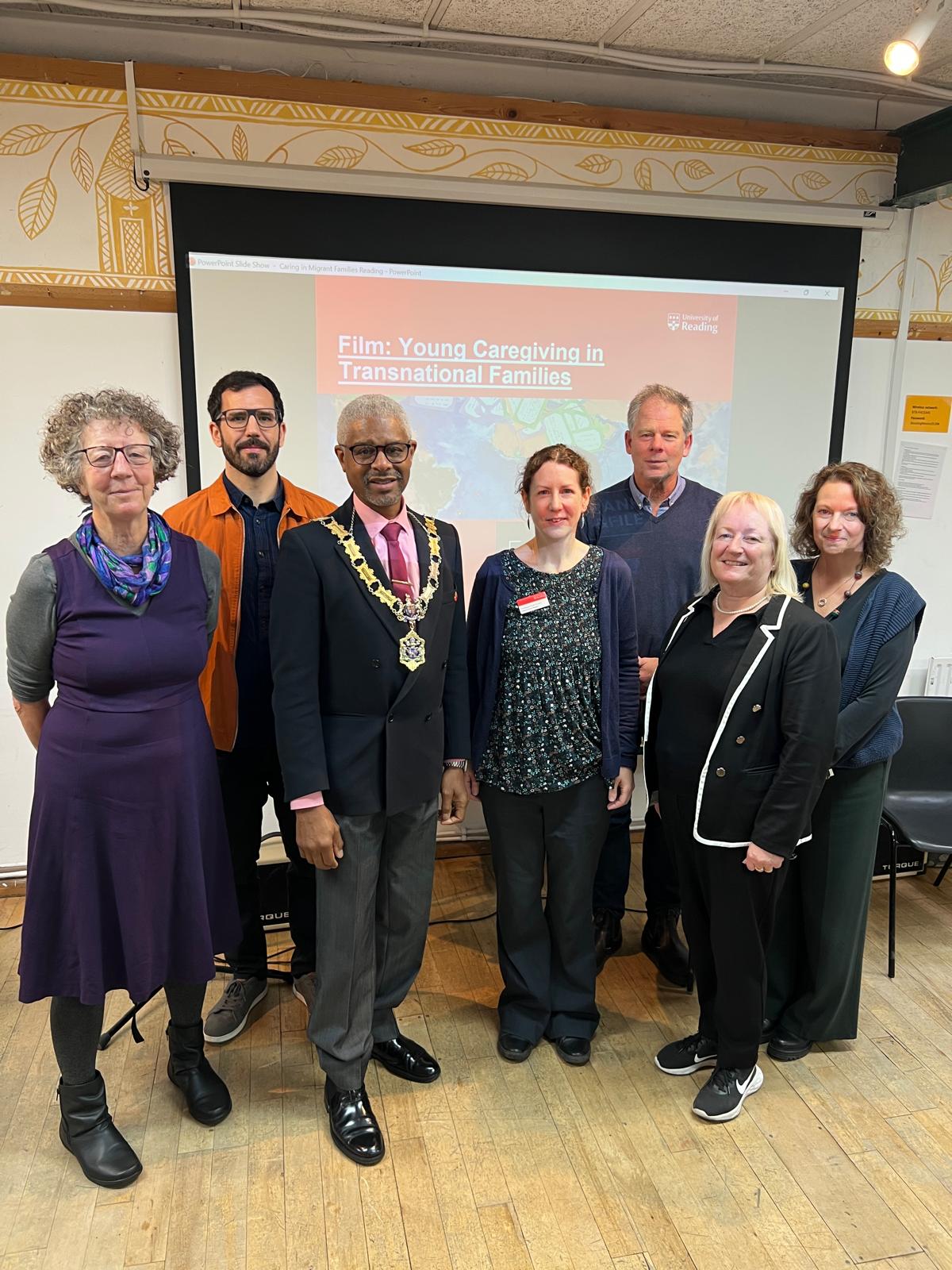The launch of the Care, Inequalities, and Wellbeing in Transnational Families in Europe report was held on 5th November 2024 at the Reading International Solidarity Centre, bringing together community leaders, practitioners, councillors and staff from Reading Borough Council, community researchers and the research team to discuss findings from this in-depth, multi-country study. This collaborative research explores the intersections of caregiving, inequality, and wellbeing among migrant families in the UK, Spain, France, and Sweden. The Mayor of Reading, Councillor Glen Dennis gave the opening welcome to the event, emphasising that migration and caregiving are closely linked in local communities. He noted that, however, that migrant carers often face multiple barriers when accessing services, which require understanding, compassion, and policy attention.
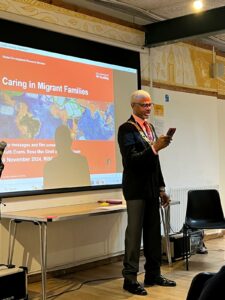
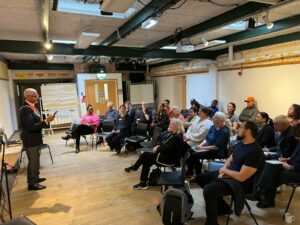
Key messages from the report were presented by lead researcher, Professor Ruth Evans, followed by a screening of a film, Language and Interpretation Needs in Accessing Healthcare, co-produced by the project, and a panel discussion with responses from key local leaders. Two further films on Young Caregiving in Transnational Families and Addressing Barriers to English for Speakers of Other Languages Classes were also screened and discussed at the event.
Study findings
This research highlights the complex realities faced by transnational families who are often separated across borders while managing caregiving responsibilities.
The report highlights how middle-generation family members often care for both younger and older generations without adequate support where there are specific care needs. For many families, geographic separation from extended relatives increases the reliance on immediate family members. While older family members sometimes move between countries to help with short-term childcare, middle-generation family members often face simultaneous responsibilities of caring for children, elderly parents, and disabled family members.
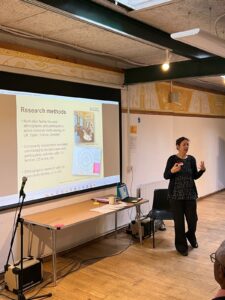
A key theme emerging across all the study locations was the role of young people as ‘language and digital brokers’ in families; they assist older generations to navigate healthcare, social and welfare services, and other critical resources. Young family members may translate complex medical and legal information for their parents and grandparents, providing vital support. However, this intermediary role can lead to stress, confidentiality concerns, and a sense of isolation for young carers, who may not be recognised formally as caregivers and lack access to support.
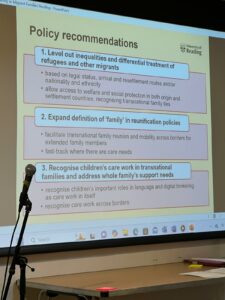
In presenting the recommendations, Professor Evans called for urgent policy changes, including reducing barriers to family reunification, especially where there are care needs, improving access to accredited English language courses, recognising young caregiving and the transnational ties of migrant carers, and ensuring sustained funding for third sector organisations supporting refugee and other migrant families. These recommendations aim to improve the accessibility and inclusivity of public services, enhance wellbeing, and acknowledge the unique challenges faced by transnational caregivers.
Language and Interpretation Needs in Accessing Healthcare
The presentation was followed by a screening of our film Language and Interpretation Needs in Accessing Healthcare, based on the lived experiences of the research participants. The research team worked with family participants and Rank and File Theatre to devise and act out some of the situations and challenges that transnational families face.
The film shows the difficulties that migrants, asylum seekers and refugees may face when trying to access health or other services due to language barriers. We follow Dalya and her mother who arrive at Accident and Emergency because Dalya has a very high temperature and needs urgent medical attention. Written forms and information are not available in their language and interpreters are not available. The solution imagined by research participants shows healthcare staff providing interpreters in a timely manner and being more helpful, having benefited from intercultural training.
Audience members were invited to share their thoughts about the film, including how they planned to use it, and the research findings more broadly, to inform their work in the future, as well as their suggestions for further recipients of this resource. Respondents planned to share the film with their practitioner colleagues in local councils and in health and social care, including Healthwatch, who are currently working to improve translation and interpreting services in the National Health Service.
Panel discussion and responses
The film was followed by a panel discussion with panellists: Councillor Liz Terry, Leader of Reading Borough Council; Nick Harborne, CEO of the Reading Refugee Support Group; Krishna Neupane, Community Researcher; and Alison McQuitty, who coordinated Refugee Support Group’s collaboration in the project. The discussion was chaired by Dr Sally Lloyd-Evans, Associate Professor in Human Geography.
- Councillor Terry emphasised the critical role Reading Borough Council plays in supporting migrant communities, particularly under Reading’s City of Sanctuary initiative. She highlighted the Council’s commitment to inclusivity and reaffirmed the importance of providing resources and advocacy for refugees and asylum seekers. She supported the report’s recommendations on improving family reunification policies and easing visa restrictions, noting that such changes would alleviate caregiving challenges and emotional stress for migrant families. However, she also acknowledged that many of these changes require national policy reforms. Terry emphasised that Reading Borough Council would ensure the report’s findings reached key decision-makers in the Council.
- Nick Harborne, CEO of Refugee Support Group, discussed the important role of third-sector organisations in supporting migrant families, who often fall through the gaps in formal service provision. He shared how organisations like his provide vital language and advocacy services, digital literacy training, and social support for refugee communities, allowing families to better navigate healthcare and welfare systems. He noted that a huge benefit of the project had been the training of community researchers and commented on the effectiveness of the collaboration with Rank and File Theatre in producing short films as a user-friendly way to share the findings. He stressed the need for long-term, stable funding, noting that fluctuating resources often hinder the sustainability of essential programmes. He described the research findings and recommendations as a “roadmap for positive change”, which would help address systemic inequalities.
- Krishna Neupane, a Community Researcher for the project, shared his experiences working directly with families to engage in ‘active listening’ and collect data. He discussed the trust-building process required to obtain genuine insights, highlighting that many families feel uneasy discussing caregiving struggles due to fears of judgment or lack of understanding. Neupane noted the challenges of translating complex emotions and experiences across cultural and linguistic divides, particularly when family members from different generations hold distinct worldviews. His involvement underscored the importance of participatory research approaches that centre community voices in data collection and advocacy.
- Alison McQuitty from the Refugee Support Group reflected on the innovative research methods used, particularly the community-led approach that engaged local residents as community researchers. She noted that involving community researchers brought unique, authentic insights to the project and welcomed the two-way dialogue and the ways that the academic team responded to what the community researchers brought to the project. McQuitty echoed concerns shown in the film about the problems of accessing appropriate interpreters and noted the barriers created by administrative systems that required people to keep repeating their stories, which could be re-traumatising for refugees. She also highlighted the report findings that inadequate language and interpreting services are linked to young people’s caregiving roles in terms of language and digital brokering.
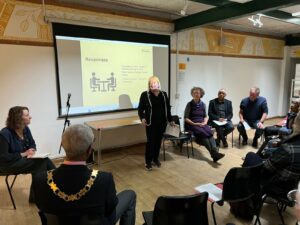
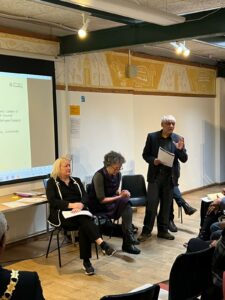
The event concluded with an open discussion on ways to implement the report’s recommendations, with attendees and panellists discussing strategies for raising awareness and influencing both local and national policies. Many attendees emphasised the importance of creating supportive, inclusive environments for transnational families, which allow caregivers to access public services without language, financial, or legal barriers. The research team reiterated their commitment to sharing the findings widely and collaborating with stakeholders across the UK and Europe to advocate for change.
The full report and summary, as well as additional resources, including films and policy briefs, are available on Transnational Families in Europe. The research team encouraged attendees to use these resources as part of training, policy development, and community engagement initiatives aimed at supporting the wellbeing of transnational families. This event marked an important step in ongoing advocacy for migrant families, highlighting the crucial role of community, academia, and policymakers working together to address complex, interconnected challenges facing transnational caregivers.
Professor Ruth Evans, School of Archaeology Geography & Environmental Science
Email: R.Evans@reading.ac.uk

